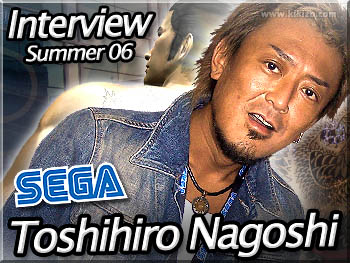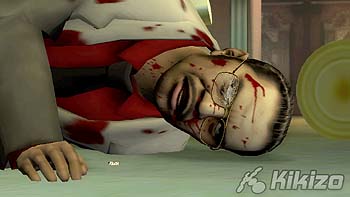Toshihiro Nagoshi Interview Summer 2006
Exclusive, detailed new interview with the Sega boss on the making of Yakuza, the latest with the Monkey Ball franchise, and various other Sega goings on. Special video feature of the interview highlights included.
It's only a few months since our last meeting with Toshihiro Nagoshi, but this time we were able to talk about much more - on record, which always helps. The president in charge of Sega of Japan's entire console game division, now called New Entertainment, enjoyed a strong E3 showing with Super Monkey Ball for the Wii finally exposed, and the fantastic Yakuza for PS2 beginning to near its Hollywood-voiced, big-budgeted, western release later this year.

We go into loads of detail about his current projects, particularly Yakuza, before gossping about other matters such as the whisky we gave him at our last interview, Yuji Naka leaving, potential for any further arcade work, and, in his words, "a lot of unfinished things left for the home videogame consoles".
In addition to the full text of the interview over the next three pages, we've opted to broadcast our usual top-notch video interview treatment to go with it (just see further down the page there) although this only contains highlights and stuff for reasons we can't be bothered to explain. We recommend you check out both and we hope you enjoy!
![]()
Kikizo: Let's start with Yakuza. Will there be any joint marketing effort with Sony to promote the game to a wide audience?
Nagoshi: We're releasing a playable demo on the September issue of the Official PlayStation Magazine in the US, which will release in August.
Kikizo: Yakuza is a very cinematic game. Were there any particular movies that influenced the game's story and development? What made you decide to give it a Yakuza theme?
Nagoshi: Since I didn't want to focus on "violence" but on "human drama", I watched a lot of great human dramas rather than the movies, which included a lot of violence scenes. Yakuza, for me, is the one of the sensitive subjects in modern days, which everybody knows of but cannot get exposed to. I chose the subject because I was convinced that this game would be the new step for the game entertainment, if I could express the great human drama based on this subject with a game.
 Toshihiro Nagoshi, President, New Entertainment division,
Toshihiro Nagoshi, President, New Entertainment division,SEGA Corporation. If this photo caught your attention, wait till you see the back of the shirt design on the next page.
Kikizo: How will the game in appeal to new gamers or light users?
Nagoshi: I tried to develop the new market by selecting a fresh theme with a new subject. This game is also a challenge to make active, hardcore gamers realize there are still great original games which they've never experienced before.
Kikizo: The Japanese console game business is in a bit of a slump, with a lot of older players having lost interest in games in the past few years. Did you make the game in response to this trend?
Nagoshi: Yes, [and] I was reassured by the fact that the Japanese version has been selling very well.
Kikizo: Why specifically do you think that the Japanese people have lost some of their interest in games? Is it because of problems within the games or game industry, or do you think there are outside factors as well?
Nagoshi: I think one of the reasons is that a lot of titles that are dominated by standardized subjects have been released. All games don't need to be created as they are derived from the limited motifs, such as the military, fantasy, and licensed IPs. We need to prove that we have broader and freer options to choose a genre from, and break down, the fixed ideas.
Kikizo: Besides fighting and progressing the primary story, what are some of the other things Kiryu [Yakuza's main character] is able to do in the game?
Nagoshi: The best part is to hang around the Japanese amusement areas, to meet a lot of people and to have an experience of living as an inhabitant of this deep underworld. Of course, your activity in the game will affect the main story.
Kikizo: Is the game's setting based on any specific location in Tokyo?
Nagoshi: I referred to the famous amusement areas in Tokyo and got some ideas from them. I really enjoyed researching the amusement areas, since I like drinking.
Kikizo: How was the whisky we brought for you last time?
Nagoshi: Very good, thank you!
Kikizo: Would you like to make Yakuza into an ongoing series, or is the game's story more or less wrapped up over the course of the game?
Nagoshi: If the response from users is great, I will think about it. At the moment, I am worried about what we are going to do. Of course, if we will create a sequel, what we develop will surpass this title.
Kikizo: Kiryu is unusual in that he's a hero in his late 30s. Most game heroes are teenagers or young adults. Why did you decide to make Kiryu an older character?
Nagoshi: Of the generations which enjoy games now, those in their 30s and over are the age groups that already had fun with games in their childhood. One of the reasons we created Yakuza this time was we wanted to develop a game that lets them experience the feeling they had when they played a game as a child once again. Certainly, Kiryu's age is higher as a game hero, but I believe such a setting suits the intended marketing.
Kikizo: The game has a large cast of minor, supporting characters. Which of these are you most fond of, and what influenced their designs?
Nagoshi: I have feelings for all characters including the enemies. The method of creating characters are the same both in designing creatures and realistic humans in that you create settings, draw designs, listen to other opinions and repeat trial and error.
Kikizo: The graphics are really pushing the limits of what the PS2 is capable of. With this in mind, did you ever consider designing the game for one of the next-gen consoles instead?
Nagoshi: Since there was no concrete sign of the next-gen consoles when we started the development, I did not consider it at all. However, we certainly did our best to the ultimate extent on a technical level. We feel no shame about describing the game graphics as one of the top on PS2.
| Video Coverage (Latest Videos & Video FAQ) | |||
| PLEASE DO NOT DIRECT LINK TO ANY MEDIA FILE ON KIKIZO | |||
| Description | Dur. | Size | Details |
|
Toshihiro Nagoshi Interview Essential! Video interview highlights of this interview including varous game clips and stuff -- high quality version |
6:22 | 112MB | ED, 16:9 856x480p60 2.5Mbps |
|
Toshihiro Nagoshi Interview Lower quality version |
6:22 | 76MB | SD, 16:9 640x360p30 1.7Mbps |
| Previous Videos | |||
|
Yakuza Direct feed gameplay |
04:27 | 41MB | DF, SD, 4:3 640x480p30 1.3Mbps |
|
Yakuza Direct feed trailer |
01:56 | 42MB | DF, ED, 16:9 852x480p30 3.0Mbps |
|
Yakuza Gameplay video - adventure |
2.06m | 16MB | SD, 30, DF 640x480 1Mbps |
|
Yakuza Gameplay video - battle |
1.44m | 13.5MB | SD, 30, DF 640x480 1Mbps |
|
Yakuza Behind the scenes look at the making of the game. |
3.13m | 25MB | SD, 30 640x480 1Mbps |
|
Yakuza High quality version of the trailer. |
3.14m | 25MB | SD, 30 640x380 1Mbps |
|
Super Monkey Ball Adventure Direct feed trailer |
02:31 | 23MB | DF, SD, 4:3 640x480p30 1.3Mbps |














 Satoru Iwata Video Interview - the late Nintendo president spoke with Kikizo in 2004 as 'Nintendo Revolution' loomed.
Satoru Iwata Video Interview - the late Nintendo president spoke with Kikizo in 2004 as 'Nintendo Revolution' loomed. Kaz Hirai Video Interview - the first of Kikizo's interviews with the man who went on to become global head of Sony.
Kaz Hirai Video Interview - the first of Kikizo's interviews with the man who went on to become global head of Sony. Ed Fries Video Interview - one of Xbox's founders discusses an epic journey from Excel to Xbox.
Ed Fries Video Interview - one of Xbox's founders discusses an epic journey from Excel to Xbox. Yu Suzuki, the Kikizo Interview - we spend time with one of gaming's most revered creators.
Yu Suzuki, the Kikizo Interview - we spend time with one of gaming's most revered creators. Tetris - The Making of an Icon: Alexey Pajitnov and Henk Rogers reveal the fascinating story behind Tetris
Tetris - The Making of an Icon: Alexey Pajitnov and Henk Rogers reveal the fascinating story behind Tetris Rare founders, Chris and Tim Stamper - their only interview? Genuinely 'rare' sit down with founders of the legendary studio.
Rare founders, Chris and Tim Stamper - their only interview? Genuinely 'rare' sit down with founders of the legendary studio. The History of First-Person Shooters - a retrospective, from Maze War to Modern Warfare
The History of First-Person Shooters - a retrospective, from Maze War to Modern Warfare